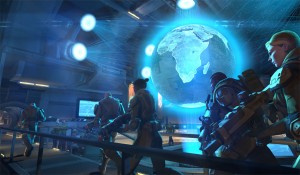Firaxis Games’ XCOM: Enemy Unknown—a remake of one of the biggest cult classics in strategy gaming history—is designed to be brutal. It’s the kind of game that doesn’t offer any easy answers, only tough decisions. It places a slew of choices before you (Research, Engineering, Airspace Domination, Infantry Recruitment, and on and on), and you’ll need to emphasize some to the detriment of others. All you can do is hope you’re making the right choices, and hope you won’t pay too mightily down the line for a bad decision. You will, though. You will pay for it.
Every facet of the game is designed to make you feel like you’re barely hanging in there, scraping the bottom of the barrel, the bottom of the wallet, and the bottom of alien skulls to maintain your global defense initiative day after day. This is precisely why XCOM:EU is such a great game: that atmosphere of struggling-against-all-odds is what makes for such an affecting experience.

And you thought I was kidding about scraping out the alien skulls.
Similarly, when you’re engaged in boots-on-the-ground combat, you’re often forced to take big risks in order to make progress. Like sending your men into the fog of war to scout out enemy troops. You can (and should) try to limit your losses by all means, but a single misstep can put your troops in some serious danger. The combat is fast, and deadly—a lot of potential damage gets thrown back and forth—and sometimes your soldiers die. And they die, die. We’re talking permadeath.
Hold on now, there, Sonny Jim. Don’t go for that ‘Load’ button just yet. Permadeath is one of the reasons why combat is so stressful in XCOM:EU—and I mean that in the best possible way—it is also an essential aspect of the game experience. To embrace this fact, however, we need to engage in a bit of de-programming. Because, as gamers, we have played so many games where things like mission failure or character death equals game over, equals re-load, start over, try again. Instead, in XCOM:EU you have to adjust to the idea of eating your mistakes and stumbling forward despite them.
You don’t have to go as far as the Dwarf Fortress community and say, “Losing is fun!” (Unless you want to, XCOM:EU has a few merciless difficulty levels for those of you who enjoy getting the socks rocked off you. And even on the lower levels, you’re not guaranteed a win.) But you do need to realize that your failures contribute to the overall joy of the experience, as counterintuitive as that may seem at first.
Choose-your-own-adventure time.
Put yourself here: “We’re in Beijing, and— Oh, crap. My two best soldiers just died. I cannot possibly complete this mission with these damn rookies. But… abandoning the mission means I lose China’s support and resources.” If you want to re-load from the beginning of the mission and try again, go to the next paragraph, labeled “Re-load.” If, on the other hand, you want to cut your losses, pull your troops back to the transport jet, and pull out of the mission, then skip the next paragraph, go to the one labeled, “Deal with it.”
Re-load: Congratulations, you’ve missed the point.
Death with it: Well played, soldier. You’re getting the point.
Of course, this particular method of weaving failure into the game design isn’t going to work for every kind of game, but I do hope that bringing XCOM fandom out out of the dusty cult closet, and exposing it to the mainstream via the remake, means a new interest in this kind of… “failure-inclusion,” let’s call it.
Certain genres already have this built in: “4X” strategy games like Civilization and Endless Space, or hybridized 4X/RTS games like the Rise of Nations and Total War series, for instance. But if you’re anything like me, you’re probably more likely to re-load than you are to deal with the consequences of failing a large-scale battle.
That’s what I mean when I say XCOM:EU brings “failure-inclusion” to a new level, or at least a different one. It feels like part of the game, and because it’s built in, you know that you are supposed to fail, at least a little. Just look at “The Memorial”—which, during a brief interview at E3 earlier this year, Lead Designer Jake Solomon told me is one of his favorite little details in the game. There, while sad bagpipe music plays in the background, you can look over a list of all your fallen soldiers: their nickname, their kill count, their final mission, and an ever-growing pile of shot glasses, fuzzy pictures and scribbled notes. It’s actually pretty somber.
I still miss my epic-level sniper queen, ‘Ghost’ Inez, but I will continue to fend off the alien invaders, keeping her ever in my thoughts. She will not have died in vain. My failure will not defeat me.
